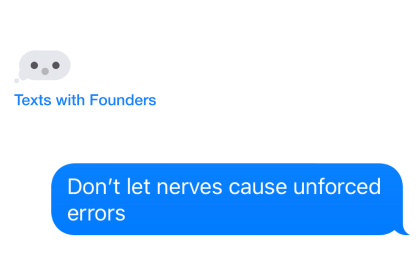Texts with Founders: The Benefits and Downsides of Responsiveness
Where it can help and where it can backfire.
Welcome to Texts with Founders — tested tactics for early stage startups. This is a free newsletter designed to give an inside look at how I work with other founders.
If you’re exploring starting a company take a look at the upcoming cohort of On Deck’s Founder Fellowship.
I was planning to write a post about how hyper responsiveness is a superpower for founders. While true, it’s also somewhat obvious and frequently discussed.
Instead, I’ll provide a counterpoint: Responsiveness can cause unforced errors. They can range from mildly frustrating to deeply harmful. It’s important to avoid that. Let’s dive in.
Responsiveness is underrated:
Substantial impact on fundraising and sales
Low lift relative to potential impact
By showing that you are quick to respond to inbound, you can build trust and credibility with potential customers and investors. Responsiveness isn’t a skill—it’s a habit that anyone can develop if they make it a priority.
But responsiveness can backfire…
If the response is not sufficiently well thought out
Some situations call for a holding pattern vs immediate response
While responsiveness can be valuable, it’s important to separate situations that benefit from a quick response and those that do not. Despite the potential benefits of being responsive, there are situations where a holding pattern or a more thoughtful and detailed response may be more appropriate.
For example, if a situation is complex or sensitive, it may be better to take some time to carefully consider your response rather than rushing to provide an answer that is not well thought out. In these cases, a holding pattern can allow you to gather more information and develop a more considered response that will be more effective in the long run.
I’ve seen far too many founders fumble a fundraise by responding too quickly to an investor. This usually comes in the form of them sending a reply that lacks clarity, is loaded with typos, or is a tactical misfire (such as pushing for an investor to decide prematurely).
After seeing these unforced errors occur multiple times it’s become clear that most founders were anxious when they sent the subpar responses. Understandable. It’s a stressful time and you want to be seen as responsible and reachable. But don’t let those desires trip you up. Take a beat. Pause. Breathe. Ask yourself if now is the correct time to be responding or if the situation benefits from waiting. If responding makes sense, it’s time to write. After you’re done, read and edit as needed.
I typically have a friend or colleague read through all of my high consequence communications. I happily do the same for friends and teammates. If possible, have a few people in your corner who will reciprocate with you.
In addition to external feedback I always read what I write out loud. It’s an effective way of detecting potential issues. I found at least five problems with earlier drafts of this post by reading aloud.
Remember that responsiveness is a tool. Make sure to utilize it effectively.
Texts with Founders is entirely free.
If you feel these resources might benefit someone you know please text or email them about it—would love for this to be of service to even more founders.
- Julian
Recent Posts:
Raise the round behind you - Avoid a drawn-out process and optimize for the best investors.
Conditional Commitments - Why they aren't commitments and what to do about them.
Avoiding Gossip - Nimbly navigate an awkward scenario.
Handling Inbound From Investors - Avoid distractions and keep potential investors warm.
No identifying information is shared in texts.





